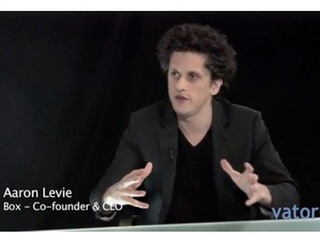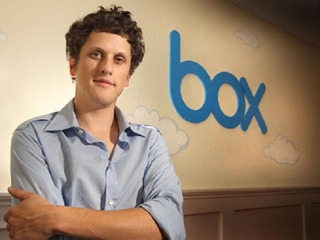When BetterHelp was young: the early years
BetterHelp and Vator have teamed up for Becoming Us, a virtual group therapy program
Read more...As our readers know, Vator has started a series called: When they were young.
It's a look back at the modest days of startups, how they evolved in their first few years, and what traction they had at the time. In the end, we hope to have a good glimpse into what great startups looked like in their first three years.
Stories like these are always well received, because it reminds us that anyone, regardless of pedigree and environment, can rise above the noise and have great influence. They show us the value of being resilient, persistent and committed. If we can follow their footsteps, maybe we too can have similar success.
Today's segment is on Box.
— Box's First Year —
Founders (age at the time): Aaron Levie (20), Dylan Smith (20), Sam Ghods, Jeff Queisser. Levie becomes CEO, Smith becomes CFO, Ghods is Services Architect and Queisser is SVP Engineering.
Founded: The idea for the company, originally called Box.net, originates in late 2004, as a business school project for one of Levie's classes while he is a sophomore at USC. The assignment is to evaluate an industry, and Levie chooses online storage. His paper focuses on what is wrong with the businesses that are already on the market, how they can be built to be better and more efficiently.
"It was very obvious that there should be a technology category that solved this problem," he later tells TechRepublic.
Initial company description: "We started the company in 2005, that's when we initially launched the product, and we had this focus on letting users share and manage and access their information from anywhere. So, the idea was really simple: you should be able to have this storage in the cloud, that would let you get to your data. It wasn't called the cloud back then, but the idea was exactly the same," Levie says at Vator Splash in 2012.
"We knew that, eventually, you'd want to get your data from any device so you had these big factors by 2004, 2005 that had changed and none of the previous companies had responded to those. So we figured that was a pretty good thesis for starting a company."
Box is initially funded by Smith's online poker winnings.
Launch at two months from founding: Box officially launches in February 2005 as both a consumer and enterprise product.

"We put up a pretty quick version of the product. We built it in a couple of months and then launched and then all of the sudden, instantly, we sort of had product market fit. This is sort of magical. The first version of the product, people started using and they started being attracted to. We didn't call it PMF, we just said that people were signing up and that was very exciting," Levie says in 2012.
Product at three months from founding, one month from launch: In March of 2005, Box launches a contest for Gizmodo users to give away free accounts for the newly launched service. 10 winners receive a 1GB account for a year, while one winner gets a 10GB online storage account with Box.net for life.
Company at four months from founding, two months from launch: On April 21, 2005, Box, Inc is incorporated in Washington State.

First funding, at nine months from founding, seven months from launch: Levie and Smith begin sending out cold emails to angel investors, initially in Seattle. One of those investors is Mark Cuban, who they ask to write about the company on his blog. Instead, Cuban puts $350,000 into the company in September 2005 without ever meeting them.
The investment convinces the team that there's a big enough opportunity that they should drop out of college to focus on Box full time.
— Box's Second Year —
Business model at one year and two months from founding, one year from launch: In February 2006, the company begins allowing users to sign up for free accounts.
"When we initially launched the site, we were thinking about profits and losses and we decided that the only way to make that work with minimal poker winnings was to charge for the product," Levie says in 2012.
"Once we really kind of worked out the model where we wanted to them open up the product for free and let anybody sign up it was great because instantly we had hundreds of thousands of people who were signing up for the product once we introduced that free version, which was totally awesome and it gave us a lot more scale to be paying attention to and it showed that more and more people wanted storage and this service in the cloud."
Product at one year and two months from founding, one year from launch: In March 2006 Box launches its mobile site.
Second funding at one years and 10 months from founding, one year and eight months from launch: In October 2006, Box raises $1.5 million in Series A funding from Draper Fisher Jurvetson.
Traction, at one year and 10 months from founding, one year and eight months from launch: In October 2006, Box has over 500,000 global users.
— Box's Third Year —
Business model, at two years and nine months from founding, two years and seven months from launch: In September 2007, Box pivots to put all of its focus on the enterprise with the launch of Box Enterprise, which allows an organization to manage up to 5,000 Box users from within a single interface.
"When we talked to the average consumer and we said, 'What would you use if you weren't using Box?' they like Box a lot but they had a list of other things that they could be using instead and for roughly the same price. And that was the kicker. They could use us for free or they could use something else for free," Levie says in 2012.
"And then when we talked to our enterprise customers, we heard something completely different. It was that they hated their alternatives. So when we would talk to an enterprise customer, they only told us about these problems that they had with their other solutions."
Traction, at two years and 10 months from founding, two years and eight months from launch: In October 2007, Box reaches one million registered users.
— Box's Fourth Year —
Third funding, at three years and one month from founding, two years and 11 months from launch: On January 23, 2008, Box announces that it has raised a Series B round of $6 million from U.S. Venture Partners and includes Draper Fisher Jurvetson.
"This capital infusion comes at a great time for us, especially given the recent growth Box.net has seen seeing in the business space. Like many other '2.0' startups, Box.net has straddled between the personal and professional worlds-- you may start using us to share photos, but we ultimately become a way to work with your marketing team, and vice versa. The power and potential of 'everything in the cloud' enables this type of flexibility and mobility," Levie writes in a blog post.
Traction, at three years and one month from founding, two years and 11 months from launch: Box has more than 1.4 million registered users
Traction, at three years and six months from founding, three years and four months from launch: In June of 2008, Box is being used in more than 200 countries.
Product, at three years and 10 months from founding, three years and eight months from launch: In October 2008, Box launches its iPhone app.

— Box's Fifth Year —
Fourth funding, at four years and 10 months from founding, four years and eight months from launch: On October 14, 2009, Box files a form with the SEC to disclose that it has raised $7.1 million. Draper Fisher Jurvetson partner Josh Stein is named on the filing.
First acquisition, at four years and 10 months from founding, four years and eight months from launch: In October 2009, Box makes its first acquisition, buying Increo Solutions.
"So why did we do this? Well, we are always looking for ways to improve how you can view, share and collaborate on documents in Box and have long admired Increo's approach to how people view, annotate and embed documents online. We saw it as a natural fit - Box lets you easily access, manage and share content, while Increo's core technologies focus on all the ways you can interact with documents and media online. Ultimately, we think it's going to provide you with really cool and productive ways to view content and collaborate on them with others," the company writes in a blog post.
Revenue, at four years and 10 months from founding, four years and eight months from launch: In October 2009, Box is named the #2 Fastest Growing Private Company in Silicon Valley by the Silicon Valley/San Jose Business Journal for 2009. From 2006 to 2008, Box grows its revenue by 869.51 percent.
— Box Today —
The company officially changed its name from Box.Net, Inc. to Box, Inc. in November 2011.
In January of 2015, Box went public, raising $175 million at a valuation of $1.65 billion. The stock has since struggled, though it is currently trading at $19.24 a share, 37 percent above its $14 IPO price.
In its most recent quarterly earnings, Box saw $136.7 million in revenue.
BetterHelp and Vator have teamed up for Becoming Us, a virtual group therapy program
Read more...Ginger started by selling health data to providers, before pivoting to becoming a provider itself
Read more...Talkspace was originally called Talktala, and focused on video group therapy sessions
Read more...Startup/Business
Joined Vator on
Box provides secure, scalable content sharing that both users and IT love and adopt, including 82% of the FORTUNE 500. Box's dynamic, flexible content management solution empowers users to share and access content from anywhere, while providing IT enterprise-grade security and oversight into how content moves within their organizations. Content on Box can also be accessed through mobile applications, and extended to partner applications such as Google Apps, NetSuite and Salesforce. Box is a privately held company and is backed by venture capital firms Andreessen Horowitz, Bessemer Venture Partners, Draper Fisher Jurvetson, Emergence Capital Partners, Meritech Capital Partners, NEA, Scale Venture Partners, and U.S. Venture Partners, and strategic investors salesforce.com and SAP.

Joined Vator on

Joined Vator on
CO-Founder and CEO of Box.






